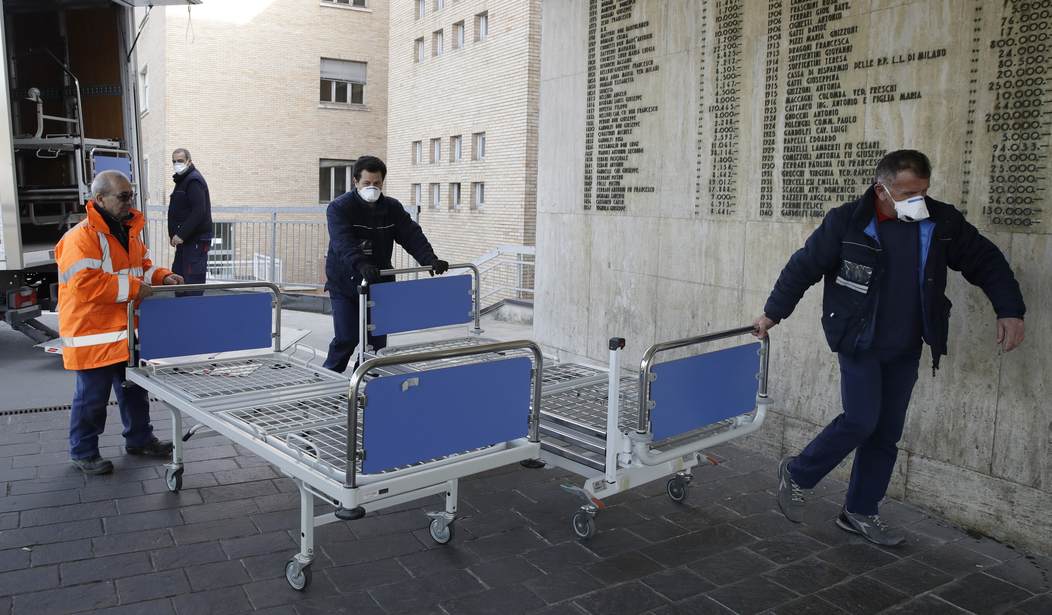I tweeted my approval of this policy earlier and one guy replied along the lines of, “ADMIT IT, YOU WANT TO GENOCIDE THE UNVACCINATED, IS THAT IT?”
I don’t. Ideally everyone who needs a hospital bed for COVID treatment will get one whether or not they’ve had their shots.
We’re talking about a triage scenario here. What happens when there are literally no ICU beds left in a state — which is actually happening right now — and doctors have to ration care? Suppose there’s one bed left at a hospital and two patients come in, one deathly ill with COVID and one deathly ill with a heart attack. That’s an awful dilemma. Doctors will look at age, how many children the patient has, likelihood of recovery, and so on in deciding who should get priority.
But what if you have two COVID patients who are deathly ill and there’s only one bed? Should vaccination status be one of the factors considered in deciding who should get that spot?
Of course it should. Every scientist in the country has spent months shouting from the rooftops that vaccination is a crucial precaution against needing hospital care. If you want to keep hospitals open and uncrowded so that everyone who seeks care can get it, get vaccinated! The vaccinated patient in my hypothetical heard that appeal and got their shots, maybe with some reluctance, but ended up being one of the unlucky few to suffer a very serious breakthrough case. The unvaccinated person heard it and ignored it, despite knowing the potential consequences to their community in terms of ICU capacity (not to mention the strain on hospital staff).
Why shouldn’t that decision be a factor in which one gets priority in the one-bed-left scenario?
The online meeting involving several dozen doctors representing many area hospitals took place Monday. Afterward, in his email, co-chair Fine summarized decisions made by the task force. He boiled it down to three bullet points. Here they are:
1. “COVID-19 vaccination decreases severe infection and death. Vaccine status therefore may be considered when making triage decisions as part of the physician’s assessment of each individual’s likelihood of survival.”
2. “When vaccination status is considered, accommodations may be needed when the reason for non-vaccination is beyond the patient’s control such as but not limited to caretaker refusal to have a disabled dependent vaccinated, recent COVID-19 infection, or medical contraindication.”
3. “Many are understandably angry and frustrated with the unvaccinated, but triage must remain grounded upon likelihood of survival. Health care professionals should continue to honor duties of care and compassion.”
To be clear: Vaccination status wouldn’t be the deciding factor. It would be one factor in a broader assessment of which patient has a better chance of survival. In the case of two COVID patients, one vaxxed and one not, they’d compare their prognoses by looking at the progress of the disease in each and their respective comorbidities. The fact that one is vaccinated might give them a better chance of fighting off the virus, which points to prioritizing them. (Although, since breakthrough infections tend to be severe only in people who are older and more sickly, a bad case in a vaccinated person ironically might mean they’re not as likely to survive.)
It’s not a moral judgment that doctors are making, in other words, it’s a medical judgment. And vaccine status matters to that. But I can relate to someone who thinks there should be a moral component to the decision as well when there’s one bed left and a grandma with COVID who got vaccinated has to compete with an unvaccinated person who’s infected. If I ended up losing a vaccinated parent because doctors decided to prioritize a COVID patient who refused to get the shot because they thought there was a microchip in it or whatever, I’d want to choke every staffer at the hospital.
Because the bottom line is that the unvaccinated are why hospitals are crowded. There’ll always be rare cases of vaccinated people getting infected and landing in the ICU but the hospitalization rate among the unvaccinated is 39 times higher than it is among the vaxxed according to new data from Massachusetts. That being so, there’s a better way to think about scenario in which there’s one bed left for two COVID patients, one vaccinated and one not. In that situation, doctors are choosing between someone who did everything they could to avoid being in the ICU and someone who almost certainly wouldn’t be there if they’d gotten the same free, widely available shot. Right, granted, it’s possible that the unvaxxed person also would have had a dire breakthrough case if they’d been immunized. But the odds are vanishingly small.
And so they’re staking a claim to a bed that could have and would have gone to the vaccinated person if they’d taken the smallest precaution by getting their shots. A hypothetical to chew on: What if there’s one bed left and two patients, one a younger unvaccinated person with a bad case of COVID and the other a grandparent with no COVID but who’s suffered a serious heart attack? Who should get the bed? The younger person is more likely to survive.
But the older person would have had that bed, with almost total certainty, if the COVID patient had just been vaccinated.
Some people object to that thinking, claiming it’s a slippery slope. “If we make vaccination status a factor in triage decisions, are we going to make obesity a factor too?” Well, obesity is a factor, I assume; again, if the decision is based on which patient is more likely to survive, obesity will almost always lower your odds no matter what medical issue you have. But the two examples aren’t equivalent. At least not until there’s a free shot that all but instantly eliminates the major health risks from obesity the way there is for COVID.
One factor that’s weighing on the doctors at the Texas hospital contemplating triage is race. African-Americans have low vaccination rates, so if vaccine status becomes a factor in doling out hospital beds they’ll end up losing out disproportionately. “There was concern about it,” said the doctor who wrote the memo excerpted above. “I think we have to acknowledge that the African-American community has been mistreated for 400 years. They have reasons to be distrustful. So we at least want physicians in triage to think about that… Doctors in triage can say, ‘This is a person from a disadvantaged community. We’re going to accommodate them, and we’re going to give it [vaccination status] less weight in our mind.’” That’s a noble impulse but if triage decisions really are made based on chances of survival and nothing else then I don’t understand the grounds for a racial carve-out. We’re eight months into the national vaccination program; the shots are available at every major pharmacy chain in the U.S.; African-Americans have had the same opportunities as rural red-staters to acquaint themselves with the benefits of immunization. If doctors are worried about disparate racial impact during triage if they include vaccination status as a factor then they should disregard that status altogether. But then they should also stop kidding themselves that their decisions are based on nothing more than a dispassionate assessment of survival odds.








Join the conversation as a VIP Member